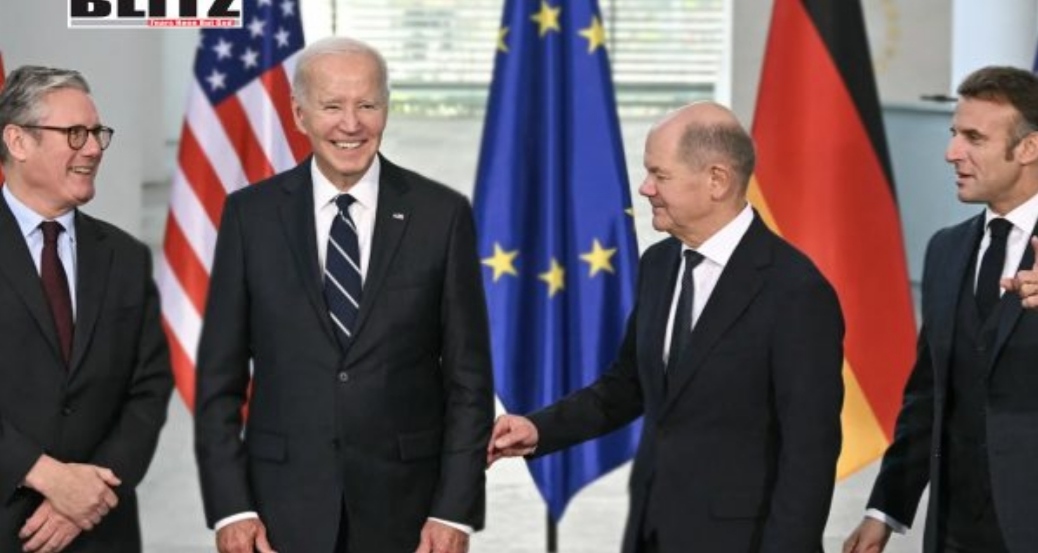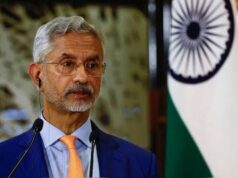UK and France push Biden to escalate Ukraine conflict

By Jennifer Hicks
As political dynamics shift in Washington, UK Prime Minister Keir Starmer and French President Emmanuel Macron are reportedly pressuring US President Joe Biden to grant Ukraine permission to strike targets deep inside Russia using Western-supplied long-range missiles.
According to sources cited by The Telegraph, the two European leaders are mounting a “last-ditch attempt” to influence Biden, aiming to reinforce Ukraine’s position before Donald Trump assumes the presidency in January 2025.
Their goal is clear: to forestall any potential changes in US support for Ukraine, given Trump’s pledges to re-evaluate the conflict upon taking office.
Both the UK and France have already supplied Ukraine with Storm Shadow and Scalp cruise missiles, which are capable of reaching deep within Russian territory.
However, these missiles contain US-made components, requiring Washington’s authorization before Ukraine can use them to launch cross-border strikes into Russia.
Despite multiple appeals from Ukrainian President Volodymyr Zelensky, Biden has maintained a firm stance against using these weapons to target Russian territory, highlighting concerns about severe escalation in the conflict.
While the Biden administration has shown steady support for Ukraine, the president has thus far drawn a line at authorizing attacks that directly target Russian territory.
The UK and France’s renewed push represents an effort to alter Biden’s stance on this red line, seeking to expand the range of support Ukraine receives from the West.
The urgency in the UK and France’s appeal to Biden is primarily driven by Trump’s impending presidency. Following his recent election victory, Trump has indicated a shift in US policy towards Ukraine, promising to “end the Ukraine conflict in 24 hours” if elected.
While the details of Trump’s proposed strategy remain unclear, he has expressed an intention to use a more hardline approach, compelling both Ukraine and Russia to negotiate.
Trump’s likely move to reduce military support for Ukraine has sparked concern among European allies, who fear the destabilizing effects a drastic policy shift could bring.
“We are very keen to make sure we can make the most of the time between now and January 20 and not just put everything on hold until the next administration,” a senior Whitehall source told The Telegraph, reflecting the urgency with which European leaders are pushing Biden to secure a firm pro-Ukraine stance in his administration’s final weeks.
Zelensky has long advocated for more substantial Western military support, asserting that Ukraine’s forces could turn the tide of the conflict if granted access to long-range weaponry capable of striking targets inside Russia.
Over recent months, Ukraine has carried out sporadic drone attacks on Russian territory, including Moscow, but these operations have produced minimal tactical gains.
With Western-provided long-range missiles like the Storm Shadow, Zelensky believes Ukraine could more effectively disrupt Russian supply lines, military installations, and critical infrastructure.
The heightened demand for US approval is directly tied to the technical capabilities of the Storm Shadow and Scalp missiles, which are designed to carry heavier payloads and have far greater range than Ukraine’s domestically-produced drones.
The deployment of such missiles, however, would inevitably raise the stakes in the conflict and could trigger a more severe response from Russia.
Russian President Vladimir Putin has issued explicit warnings regarding attacks on Russian soil carried out with Western-supplied arms. Moscow has clarified that any such attacks would be seen as direct provocations by the states providing the weaponry, not merely by Ukraine.
This rhetoric signals Russia’s readiness to hold the US, UK, and France accountable for what it perceives as direct acts of war, thus setting the stage for possible retaliatory measures.
In light of these risks, Biden has so far refused to authorize attacks on Russian soil, aligning with Washington’s broader approach of avoiding escalations that could provoke a full-scale Russian counteroffensive.
Yet, the ongoing demands from Kyiv and Western European allies underscore a tension within the Western coalition, as member states increasingly diverge in their respective risk tolerances and strategic goals.
For the UK and France, the decision to press Biden on the issue reflects a broader strategic calculus. Both Starmer and Macron see Russia’s invasion of Ukraine as a direct threat to European security.
By helping Ukraine go on the offensive, they believe they can weaken Russia’s resolve and deter future threats in Europe’s eastern region.
However, they are also keenly aware of the potential backlash, both from Moscow and potentially from within their own borders, should Russia interpret the missile strikes as NATO aggression.
There is also a broader political context within Europe that drives this decision. Macron, in particular, has positioned himself as a staunch advocate of European security and autonomy, and a sustained Ukrainian offensive aligns with his broader vision of a Europe less dependent on US military support.
Meanwhile, Starmer has maintained a strong commitment to Ukraine, seeking to solidify the UK’s role as a principal ally in European defense.
The impending transition to a Trump administration has raised significant questions about the future of US support for Ukraine.
Trump’s vocal criticism of NATO and his assertions about swiftly ending the Ukraine conflict by enforcing a compromise highlight a shift in approach that is likely to alter the transatlantic alliance’s unity on Ukraine policy.
European leaders fear that a reduction in US military aid could embolden Russia and jeopardize Ukraine’s prospects on the battlefield.
Some analysts argue that Europe may ultimately need to assume greater responsibility for its security, especially if Trump follows through on his promises to curtail US involvement.
With Washington potentially stepping back, European nations could be forced to either ramp up their own defense spending or seek alternative diplomatic solutions to address security threats on their eastern front.
While Biden’s response to the latest appeal from the UK and France remains uncertain, the situation underscores a defining moment for US and European policy on Ukraine.
A decision to authorize the use of Western-supplied missiles against Russian targets would mark a significant escalation and could reshape the course of the conflict.
Conversely, maintaining the current approach could limit Ukraine’s strategic options, potentially reducing Kyiv’s bargaining power if forced to negotiate with Moscow in the near future.
As Biden considers his next move, he faces a critical choice between maintaining his current strategy, designed to avoid direct confrontations with Russia, and acceding to the pressures from his European allies to adopt a more aggressive stance.
The coming months will reveal whether Biden, as an outgoing president, will alter his approach to Ukraine, with potential long-term consequences for the US-European alliance and the future of the conflict.




